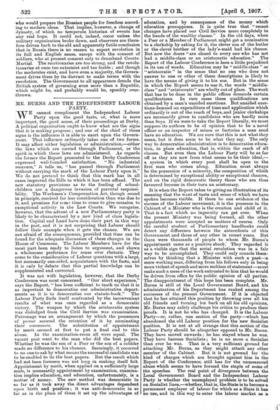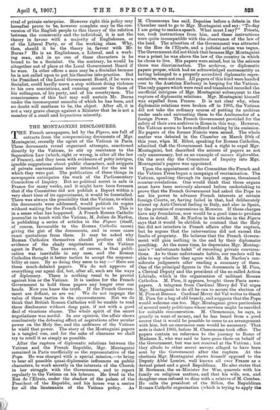MR. BURNS AND THE INDEPENDENT LABOUR PARTY.
WE cannot compliment the Independent Labour Party upon the good taste, or, what is more important, the good sense, of their proceedings at Derby. A political organisation ought to know what are the signs that it is making progress ; and one of the chief of these signs is the influence it is able to exert upon the Govern- ment. That influence ordinarily takes one of two forms. It may affect either legislation or administration,—either the laws which are carried through Parliament, or the spirit in which these laws are administered. As regards the former the Report presented to the Derby Conference expressed well-founded satisfaction. " No industrial measure," it tells us, " has passed through Parliament without carrying the mark of the Labour Party upon it." We do not pretend to think that this mark has in all cases improved the Bills to which it has been affixed. The new statutory provisions as to the feeding of school- children are a dangerous invasion of parental responsi- bility. The Workmen's Compensation Act, though sound in principle, received far less consideration than was due to it, and promises for 607113 time to come to give occasion to exceptional activity in the Law Courts. We recognise, however, that the advent of a new Parliamentary party is likely to be characterised by a new kind of class legisla- tion. Capital. and Land have done their part in this way in the past, and it is not surprising that Labour should follow their example when it gets the chance. We are not afraid of the consequences, provided that time can be found for the adequate discussion of these changes in the House of Commons. The Labour Members have for the most part been ready to listen to argument, and shown a wholesome preference for sense over rhetoric. They' come to the consideration of Labour questions with a large, but necessarily one-sided, acquaintance with the filets, and it is only by debate that this partial knowledge can be supplemented and corrected.
It was not with legislation, however, that the Derby Conference was most concerned. " Our short experience," says the Report, " has been sufficient to teach us that it is as important to democratise our administrative depart- ments as it is to democratise our statute-book." The Labour Party finds itself confronted by the inconvenient results of what was once regarded as a democratic victory. The weapon by which the aristocratic system was dislodged from the Civil Service was examination. Patronage was an arrangement by which the possessors of power secured the retention of it by nominating their successors. The substitution of appointment by merit seemed at first to put a final end to this abuse. In the examination-room all were equal. The vacant post went to the man who did the best papers. Whether be was the son of a Peer or the son of a cobbler made no difference to his chances. Seemingly, it occurred to no one to ask by what means the successful candidate was to be enabled to do the best papers. But the result which had not been foreseen was not long in making itself felt. Appointment by merit, when applied on a sufficiently large scale, is necessarily appointment by examination, examina- tion implies education, and education, unfortunately, is a matter of money. The new method was democratic in so far as it took away the direct advantages dependent upon birth and position ; it was anti-democratic in so far as in the place of these it set up the advantages of education, and by consequence of the money which education presupposes. It is quite true that "recent changes have placed our Civil Service more completely in the hands of the wealthy classes." In the old days, when a Peer or a Member of Parliament might get a nomination to a clerkship by asking for it, the clever son of the butler or the clever brother of the lady's-maid had his chance. But now the doors " are closed to every one who has not had a middle-class or an aristocratic education." The Report of the Labour Conference is here a little prejudiced in its use of words. Education may be " middle-class " or "aristocratic " in the sense that no one who does not answer to one or other of these descriptions is likely to have the means of giving it to his son. But in the sense in which the Report seems to use it, the words " middle- class " and " aristocratic" are wholly out of place. The work that has to be done in the public offices demands certain qualifications. In rare cases these qualifications are obtained by a man's unaided exertions. But unaided exer- tions demand an expenditure of time and application which ordinarily is out of the reach of boys, and junior clerkships are necessarily given to candidates who are hardly more than Boys. If we were to take the Report literally, we must suppose its authors to be of opinion that to be a naval officer or an inspector of mines or factories a man need have no education. We are sure that this is not what they mean, but it does seem to be what they say. The only way to democratise administration is to democratise educa- tion, to place education, that is; within the reach of all classes. But even then the Labour Party will be as far off as they are now from what seems to be their ideal, a system in which every post shall be open to the first man who comes along. Education must always be the possession of a minority, the composition of which is determined by exceptional ability or exceptional chances, and on the rigid democratic theory those who are thus favoured become in their turn an aristocracy.
It is when the Report takes to giving an illustration of its meaning that the want climbs and sense of which we have spoken becomes 'visible. If there be one evidence of the success of the Labour movement, it is the presence in the Cabinet of a Minister who is the creation and child of it. That is a fact which no ingenuity can get over. When the present Ministry was being formed, all the other appointments were accepted as matters of course. Only the careful student of Parliamentary handbooks could detect any difference between the antecedents of this Government and those of any other in recent years. But there were thousands of people to whom Mr. Burns's appointment came as a positive shock: They regarded it as a visible sign that the social revolution was in a fair way to be accomplished. They could only console them- selves by thinking that a Minister with such a past—a mere working man, differing from his fellows only in being more violent of speech and more reckless of statement—must make such a mess of the work entrusted to him that he would be driven from office by the public opinion of all parties. The disappointment of this hope has been complete. Mr. Burns is still at the Local Government Board, and his administration of his Department has ranked among the successes of the present Government. If it is objected that he has attained this position by throwing over all his old friends and turning his back on all his old opinions, Mr. Burns may safely challenge his critics to produce their proofs. It is not he who has changed. It is the Labour Party—or, rather, one section of the party—which has abandoned the old Labour position for the new Socialist position. It is not at all strange that this section of the Labour Party should be altogether opposed to Mr. Burns. They have moved onwards ; he has stayed where he was. They have become Socialists ; he is no more a Socialist than ever he was. That is a very sufficient ground for attacking Mr. Burns, as they might attack any other member of the Cabinet.' But it is ' not ground for the kind of charges which are brought against him in the Report of the Conference; still less for the unmeasured abuse which seems to have formed the staple of some of the speeches. The real point. of divergence between the Local Government Board and the Independent Labour Party is whether the unemployed problem is to be solved on Socialist lines,—whether, that is, the State is to become a, permanent employer of labour for which as a State it has no use, and in this way to enter the labour market as a
rival of private enterprise. However right this policy may hereafter prove to be, however complete may be the con- version of the English people to this theory of the relation between the community and the individual, it is not the theory in favour with a majority of Englishmen, or of the Liberal Party, or of the working class. Why, then, should it be the theory is favour with Mr. Burns ? He is an Englishman, a Liberal, and a work- ing man, and in no one of these characters is he bound to be a Socialist. On the contrary, he would be altogether out of place at the Local Government Board if he were. In other offices a man may be a Socialist because he is not called upon to put his theories into practice. But the President of the Local Government Board, if he were a Socialist, could hardly move a. step without doing violence to his own convictions, and running counter to those of his colleagues, of his party, and of his countrymen. The consciousness of this fact may well sustain Mr. Burns under the inconsequent assaults of which he has been, and no doubt will continue to be, the object. After all, it is not a very grave charge against a Minister that he is not a member of a small and loquacious minority.











































 Previous page
Previous page